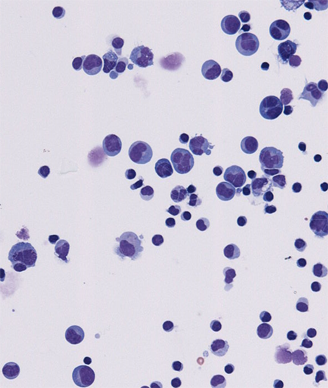New R-CHOP Regimen Promising in DLBCL Subtype
Phase II study results show that a new combination of drugs known as R2CHOP had promising efficacy in the treatment of relapsed diffuse large B-cell lymphoma.
CSF cytology of a diffuse large B-cell lymphoma; source: Wikimedia Commons

Results of a phase II study indicated that a new combination of drugs known as R2CHOP-lenalidomide, rituximab, cyclophosphamide, doxorubicin, vincristine, prednisone-had promising efficacy in the treatment of relapsed diffuse large B-cell lymphoma.
In addition, results showed that the addition of lenalidomide to R-CHOP eliminated any negative effect of the treatment in patients with non-germinal center B-cell (GCB)-like disease.
“The mechanisms of action of lenalidomide that are novel and distinct from both traditional chemotherapy and rituximab provide a strong rationale for the introduction of lenalidomide to first-line therapy in DLBCL,” Grzegorz S. Nowakowski, MD, of Mayo Clinical, Rochester, Minn., and colleagues wrote in the Journal of Clinical Oncology.
Nowakowski and colleagues enrolled 64 patients with newly diagnosed untreated stage II to IV diffuse large B-cell lymphoma. Patients were assigned treatment with lenalidomide 25 mg per day on days 1 to 10 with standard-dose R-CHOP every 21 days for 6 cycles. Patients were also analyzed for molecular subtype and classified as having GCB or non-GCB disease.
Sixty patients were available for response evaluation. Researchers calculated an overall response rate of 98%, with 80% of patients achieving a complete response. Nineteen patients died after disease progression.
Patients were followed for a median of 23.5 months. At 12 months, the event-free survival was 70%; at 24 months it was 59%. The overall survival rate was 90% at 12 months and 78% at 24 months.
The researchers further evaluated the results by disease subtype. They compared outcomes of patients treated with R2CHOP to a group of control patients treated with R-CHOP alone. Two-year event-free survival in patients treated with R-CHOP alone was 52%.
Those patients with non-GCB disease treated with R-CHOP alone had a 2-year progression-free survival of 28% compared with 64% in patients with GBC disease (P < .001). Overall survival was also significantly worse for patients with non-GCB disease treated with R-CHOP compared with those with GCB disease (46% vs 78%; P < .001).
In contrast, among patients treated with R2CHOP there was no significant difference in 2-year progression-free survival or overall survival among patients with GCB or non-GCB disease.
“Good tolerability of the R2CHOP regimen was reflected by a large majority of patients who received the intended dose of therapy,” the researchers wrote. “Although some patients refused continuation of treatment on the study following cycle 1, all four refusals resulted from patients’ preference to receive treatment closer to home and all patients continued R-CHOP therapy alone afterward.”
Navigating AE Management for Cellular Therapy Across Hematologic Cancers
A panel of clinical pharmacists discussed strategies for mitigating toxicities across different multiple myeloma, lymphoma, and leukemia populations.